When I catch a cold, it normally runs the same course - four days of shivering sneezing misery followed by four weeks of getting rid of the gunk which clogged up my tubes (sorry to those of a sensitive disposition!). So it has been with me this last fortnight, and I've been catching a cold financially too.
I took out an ad in the Independent on Sunday on 13th March, and wished I hadn't bothered. The ad agency had contacted me with the offer of a panel, which had become available due to cancellation by someone else, at the bargain rate of £185 + VAT, as opposed to the "normal" rate of £600 + VAT. Their circulation figures were around 700,000, which is certainly a lot more than that of the special interest mags in which I've advertised up to now. I went for it, as I've been considering advertising in one of the "big" papers for some time (just to see what would happen!), and I probably wouldn't get a better deal than the one which was being offered. They designed a beautiful panel for me, and it duly appeared in the magazine section of the paper (at the foot of a page of similar-sized ads). My website viewing log showed the poorest figures for a month that day, so I now KNOW this doesn't work!
In anticipation of the increase in sales which the advert would produce, I had invested another £200+ in new stocks of greeting cards and giclee prints. I have sold a few of these lately, but not in a quantity which would justify the expense I've incurred over it. Then, on Saturday 12th March, my computer desktop monitor packed up, and I had no option but to replace it , at a further cost of £150. Ouch! For a self-employed artist on a very modest income, an outlay of £600 over the course of a single week, before I'd even bought myself something to eat, is a fairly serious matter.
Thank goodness it hasn't been all bad news. My client loved the painting of the ill-fated fishing boat "Kildonan" (see posting 28/02/2011), and I've received a commission to do a number of "Nort Boat" paintings for the St. Magnus Bay Hotel in Hillswick. I've now started this, with the "Sovereign", a paddle steamer which was one of the earliest in the fleet, having been acquired in 1836 and running on the Aberdeen - Shetland route until 1867, when she was wrecked near Aberdeen.
I've been working steadily on the stock/exhibition works too. I've nearly finished a Howe o' the Mearns landscape, and have begun another seascape with an "under sail" theme, which has a dual purpose in that the 2012 Tall Ships race is visiting these islands in July. I expect I'll be getting some themed greeting cards and giclee prints for that event too.
Aaaachoo!
The Grumpy Old Artist

Would YOU pose for this man???
Exhibition Poster

Catterline Event, 2011
Oil Painting by Jim Tait
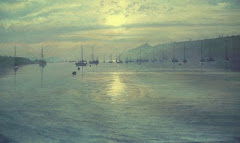
Helford River, Cornwall
Oil Painting by Jim Tait
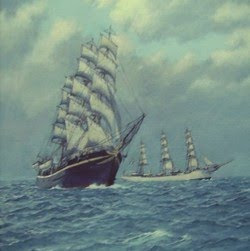
Full-riggers "Georg Stage" and "Danmark"
Other Recent Works

Fordyce Castle and Village

Hay's Dock, Lerwick

Shetland-model Boats at Burravoe, Yell
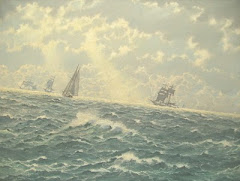
Tall Ships Seascape

The Tour Boat "Dunter III", with Gannets, off Noss
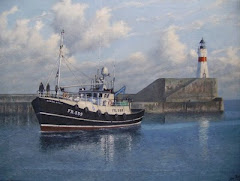
The "Karen Ann II" entering Fraserburgh harbour
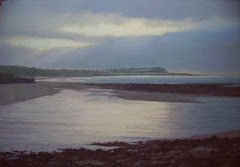
Summer Evening, Boyndie Bay
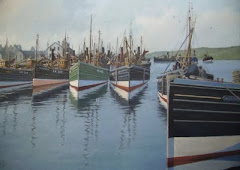
1930s Lerwick Harbour

Johnshaven Harbour
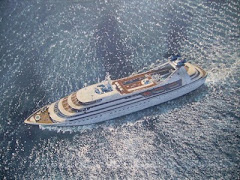
"Seabourn Legend"
Greeting Cards!

Now Available in Packs of Five or in Assorted Sets of Four
Sunday, 20 March 2011
Monday, 7 March 2011
HAZARDS OF SEAFARING

This is my version, in oils on canvas, of the Shetland fishing boat "Kildonan", passing the Bressay lighthouse as she approached Lerwick harbour. She would have done this many times in her short career. She was a 50-odd foot "zulu", built originally as a sailing vessel, and had been fitted with a wheelhouse and a diesel engine, as many of this class of boat were, in the years just following the first world war. One early summer morning in 1932, her crew had just finished hauling a good shot of herring, and one of the two brothers who owned the boat went down to start the engine for the short voyage back to the market at Lerwick. Instead of starting in the usual manner, it went on fire, the blaze spread quickly, and the crew had no option but to abandon ship and take to the small boat to watch their livelihoods go up in flames before their eyes. The skipper, whose daughter (now aged 80) commissioned the work from me, once said that the saddest sound he had ever heard was that of the drift-net buoys bursting in the intense heat.
No doubt fire-fighting equipment was much less sophisticated in those days than that carried as standard and by regulation now. In addition, there are the many other modern safety devices, without which no present-day skipper would ever even consider putting to sea. Some of this is electronic, some connected with advances in other fields of technology and communication, such as the EPIRB (Emergency Position Indicating Radio Beacon), whose prosaic title bears similarities to the "does exactly what it says on the tin" advertising slogan, all of it designed to improve the safety of mariners at sea.
And then there is, but not for much longer in its present form apparently, the Coastguard, a worthy organisation of people dedicated to keeping seafarers healthily afloat. They, being local to their station, know the coastline and the inshore waters in their local areas intimately, and have representatives on call at all times to deal with any emergency which may arise (and frequently does). Their radios and other points of contact are constantly manned to pick up signals from any vessel which might be in trouble, and they normally take control of any rescue operations which may have to be mounted in their areas, be it a ship in distress, a cliff fall or stranding (man or beast!), or a missing shore walker. In short, if anyone's safety is compromised, either at sea or near the shoreline, the coastguard is there to use its local knowledge and skills to put an effective rescue plan into motion.
Until now, that is. In order to save a few million quid, the coalition government wants to shut the local coastguard stations (the few that are left) down. Hapless beleaguered-looking representatives have been despatched to the various locations where the doomed stations are situated, with the remit to persuade the turkeys that voting for Christmas IS a good idea, that closing the stations is a wonderful scheme which will make the system SO much more efficient, and is NOTHING AT ALL to do with the fact that our rulers need to recoup the huge sums dished out to senior bankers as a reward for practically bankrupting the country, and putting seafarers' lives at risk is a price worth paying for this. They are having difficulty selling this to the natives, however. The deal is this - there will be one fully manned technology-driven unit in Aberdeen, and one other part-time 9 to 5-opening one at either Stornoway or Lerwick (fight amongst yourselves for that one, folks!). Tough if your job takes you to sea outwith these hours, as most seafarers' jobs do! Are there really people in Regulationville who think that seamen finish their eight-hour shift, change into their casuals and have a pint in the pub on the way home to the wife and kids?
Then there were the coastguard tugs (now off contract, I believe, and in the process of getting repainted for their new jobs), which were introduced in the aftermath of the "Braer" oil spill. They were to cover the sea areas around the Western and Northern Isles, to take broken-down ships (of which there have been many) in tow, thus guarding our coastlines against pollution, and crews' lives from being lost at sea in these busy areas. I almost laughed out loud when I heard about the Royal Navy nuclear submarine HMS "Astute" grounding off the Gairloch last year, and having to be towed off by one of the very ships they want to get rid of!
Of course, closing Coastguard stations is nothing new. The last government got rid of the Orkney station, amongst others, and in England, the National Coastwatch Institution, http://www.nci.org.uk/ was set up in 1994 as a kind of substitute for defunct Coastguard units. It is entirely staffed by unpaid volunteers and supported entirely by voluntary contributions (rather like the RNLI, it seems), but this body has no representation north of the border as yet, as far as I know. I hate the idea of this really, as it appears to let a Government of knaves and charlatans get away with their incompetence, mismanagement of resources, and callous indifference to the wellbeing of sailors and others who rely on them for a degree of protection. Once again, an essential service is being sacrificed on the altar of capitalism and consumerism. This is what David Cameron calls the "big society", after all - people who will work for nothing and let him "off the hook", to use a fishing expression.
Comparing the summer of 1932 with the present day in terms of safety at sea is not easy, and there are few similarities. Marine diesel engines were at an early stage of development back then. Rescue equipment was limited to a wooden lifeboat, a few lifebelts, the strong arms of the fishermen themselves and anything else that came to hand at the time! Nowadays there are advances in technology and safety devices too numerous to list here. This is just as well, for this government has made it clear that, as far as it is concerned, we could be back to the 1930s. The sea is still as dangerous a workplace as it ever was, and I hope that every time a life and/or a livelihood is lost with this evil coalition's tacit approval, they are left in no doubt of the fact. I am sure that the media, in its various forms, will be delighted to assist!
Subscribe to:
Comments (Atom)








